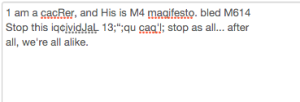I read somewhere recently:
Getting your data off the internet is like trying to get piss out of a swimming pool.
I really liked that. (I wish I know who said it; if you know please tell me.) UPDATE: Headcrash found the origin (or as far back as this appears to go). Apparently this was a line from the massively underrated television show, Newsradio:
I was part of a conversation recently where the topic of discussion was how to keep your data out of the big system. Stay off Facebook, avoid Twitter, keep everything behind a VPN, don’t take your mobile phone anywhere you don’t want someone knowing you were .. you know, the kind of stuff even I used to file under “tinfoil hat nonsense” until some years ago.
Anyway, it struck me that it’s pretty much impossible to operate like a human being in the contemporary western world and keep your data out of the hands of people who will use it in ways you don’t agree with, or sell it/give it away to people you don’t want to see it. The entire corporate internet is set up to take your data, suck it up like a relentless black hole that absorbs everything it can find.
If you want to live like a normal Western 21st century human being means that your data will leak onto the internet at some point, in some form. You will sign up for a Gmail address, a Facebook account, a Twitter account, a newsletter, or you’ll download an app or you’ll buy something online, an innocent act that allows a spigot to be shoved into your personal flow of data, and some invisible entity to siphon off all it can. These procedures are so painless, so buried in terms and conditions implicitly or lazily agreed to (and we all click Agree for the sake of convenience, all the time), that moving through the digital realm without a trace has become, if not impossible, then incredibly fucking hard. The piss leaks into the pool; good luck finding all of yours and extracting it.
There is a weakness in this data-siphoning system, however: it’s indiscriminate. It assumes everything it knows about you is true. It assumes you don’t lie. Facebook didn’t bat a robot eyelash when I changed my gender to see if it would change the advertising I got (big surprise: it did). It accepted what I gave it, moved on, accepted it without prejudice.
Could the solution to this invasion of privacy, then, be not to extract one’s own piss, but rather add more piss?
If we can’t move through the digital realm without a trace, then surely we can cover our tracks with sufficient digital garbage that it’s impossible to tell what’s a real footprint and what isn’t, to give the algorithms all the data they can eat – because if there’s one thing we all know about algorithms, it’s garbage in, garbage out. Hide in plain view by covering yourself in garbage. Like everything. Fill out all optional fields. Choose a new age range every day. Move between genders. Shopping websites and consumer entities may know that a woman is pregnant before she has told a living soul, but how can these algorithms infer pregnancy if they have no idea what gender they’re dealing with?
This has already been played with, to some extent, with the Chrome plugin Valley Girl, which clicks “Like” at every opportunity presented. No matter where you are on the internet, if there’s a Like button, Valley Girl will click it. After a matter of weeks, what you really like becomes immaterial; your taste, your humour, your political leanings are obscured by the sheer volume of noise inserted into what Facebook knows about you.
High five, Valley Girl. I hope you piss into the gutter of my Facebook data profile forever and ever.

